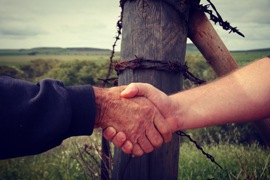Family Farm Succession Planning
Farmers and primary producers who run livestock or grow crops or use their rural properties to engage in the manufacture of products (such as grape growers and dairy farmers) covers a broad range of people with special needs.
One of the most common examples of the challenges facing family farm succession planning is that parents intend to leave their farming business and property to one of the children who has stayed on to work the farm, and to exclude the remaining children. Because farmers are often asset rich and income poor, they often have little way to make distributions equal and fair between their children. The volatility of farming also exacerbates this.
 Family farming businesses do have one main advantage, and that is that stamp duty can be avoided during any restructure during the succession planning process. Stamp duty in Victoria does not have to be paid on transfers of farming property between family members or into new family structures.
Family farming businesses do have one main advantage, and that is that stamp duty can be avoided during any restructure during the succession planning process. Stamp duty in Victoria does not have to be paid on transfers of farming property between family members or into new family structures.
A good understanding of the current farm business structure is important to be able to plan succession. Often farms are run in partnerships or in trusts, with land titles held in personal names or sole names. But there are many other combinations that might exist. Also, don’t forget the water shares that are now unbundled from the land, but often attach to the land with a water use licence. Water can also have significant value, and does not have to follow the ownership of the land.
Some options for dividing assets amongst the next generation include:
- giving an option to purchase the farm to the child who has remained with the parents, farming. A percentage of the value of the farm can be set in the Will, and that way the other children could receive some value;
- giving the farm land to the children equally, but with a long-term lease for the farming child. The farming child would need to pay rent;
- giving the farming business to the children equally, but with a direction that farm income be divided a certain way, so that the child farming will receive the greater portion;
- giving the farm to the child who has remained farming, and equalising the gift by taking out life insurance or insurance bonds for the other children to inherit;
- setting up farming property trusts with specific beneficiaries during life instead of under the Will …
There are many options, but it will take thought and planning. It will also be necessary to take into account the specific circumstances of each farm business, and also the characteristics and personalities of the successor children.




